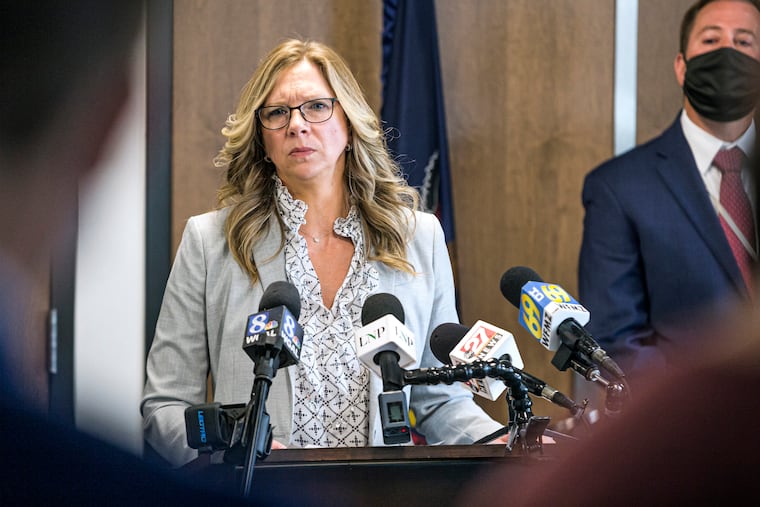Lancaster County is reviewing 2,500 voter registration applications for possible fraud
The concerning applications were not specific to one political party, officials said.

Lancaster County officials announced Friday that they are reviewing roughly 2,500 voter-registration applications that were submitted just before the state’s deadline after flagging indicators of possible fraud.
Among the issues identified were duplicate handwriting, fake names, inaccurate addresses, or signatures that did not match the ones already on file.
The concerning applications, which officials say were not specific to one political party, came in two large drops just before this week’s registration deadline, Lancaster County District Attorney Heather Adams, a Republican, said at a news conference Friday.
She did not say how many of the 2,500 applications were suspected as fraudulent but said officials were continuing to work through them. Her office is investigating alleged criminal and election code violations.
In Lancaster County — a GOP stronghold that was a hotbed for election conspiracies in recent elections — the announcement could sow doubt in the results of next month’s election even as it also seems to shows the system’s protections against fraud working.
The applications were part of two large batches totaling more than 2,500 applications submitted on Oct. 18 and Oct. 21, the final day to register to vote in Pennsylvania before the Nov. 5 election, and have since been isolated by the county election’s board for further investigation.
In some circumstances, Lancaster County investigators found that the information was correct on the form — except for the signature — but once the voter was contacted, they said they did not submit it.
Adams declined to say which group or individuals are being investigated as part of the alleged voter registration scheme, but said the investigation was related to paid canvassers who sought applications in public places around Lancaster County.
Speaking to reporters at an unrelated event, Pennsylvania Secretary of State Al Schmidt said his office was aware of the issue and had been in touch with Lancaster County officials. He said election officials must be “conscientious” when dealing with potentially fraudulent applications.
“You’ve got to make sure that any eligible voter who applied isn’t disenfranchised from the process,” said Schmidt, a Republican appointed by Democratic Gov. Josh Shapiro to oversee elections. “But at the same time, they have a responsibility in the election code to make sure that anything submitted to them that is fraudulent in nature doesn’t impact the election at all.”
“We have an obligation under the election code,” said Lancaster County Commissioner Ray D’Agostino, a Republican. “Not only that, but a moral obligation to investigate any matters of potential fraud.”
Most of the allegedly fraudulent applications are among Lancaster City residents, but stretch across the county, a GOP stronghold about 80 miles west of Philadelphia.
Lancaster County Commissioner Josh Parsons, the Republican chairman of the board, noted that there are grassroots activists who have been registering voters across the state, which “we 100% support, regardless of your party.”
“It’s not unusual for having a large number of voter registrations coming in,” Parsons said. “This is a specific organization and we’ll deal with that.”
At least two other counties are criminally investigating similar fraudulent applications, said the Lancaster County district attorney, without identifying which ones.
John Adams, the district attorney for Berks County, said the issue is on his office’s radar and that the county may have also received some fraudulent applications.
“We believe we have some and we will be looking into them,” said Adams, a Democrat.
Michael Morley, an election law expert at Florida State University, said the allegations in Lancaster County follow a common trend when organizations pay workers to help register to vote. If groups pay per application, or set a quota, an incentive is created for some workers to falsify applications.
Often, he said, these instances are caught by election workers. If not, the newly registered voters are eventually removed from the voter rolls due to inactivity. While it, in theory, creates a threat for fraudulent votes to be cast that is almost always not what happens, he said.
“It’s a serious problem and it undermines the integrity of the voter registration rolls, it puts more pressure on election officials to detect this fraud,” Morley said. “But even if it gets through that’s sort of the end of the line. It’s not part of a bigger picture plot to steal the election.”
The leader of one of the groups credited for major increases in Republican registrations across Pennsylvania and has specifically targeted Amish populations across the state, Early Vote Action, said his organization is not responsible nor is being investigated.
Scott Presler, who leads Early Vote Action, said in a statement posted on X that he could “unequivocally state” that his organization is not being investigated, and the most forms they ever turned in at once was 400 in Luzerne County, just before registered Republicans began outnumbering Democrats there.
The issue is unrelated to an issue that arose earlier this week, in which Schmidt said Lancaster County broke federal and state law by denying some Franklin & Marshall College students from registering to vote or requesting a mail ballot if they had an active voter registration in another state.
Though it is illegal to vote in two states, it is not illegal to be registered in two states, and college students have a right to vote in the state where they attend school.